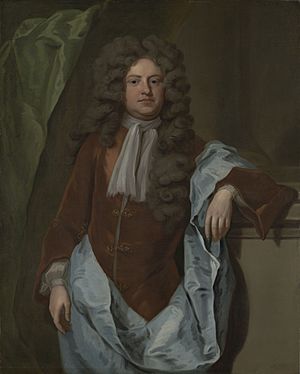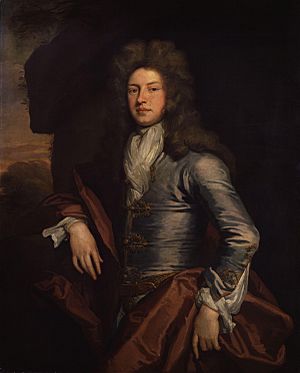Charles Montagu, 1st Earl of Halifax facts for kids
Quick facts for kids
The Earl of Halifax
|
|
|---|---|

Portrait by Michael Dahl
|
|
| Chief Minister of Great Britain First Lord of the Treasury |
|
| In office 13 October 1714 – 19 May 1715 |
|
| Monarch | George I |
| Preceded by | The Duke of Shrewsbury as Lord High Treasurer |
| Succeeded by | The Earl of Carlisle |
| In office 1 May 1697 – 15 November 1699 |
|
| Monarch | William III |
| Preceded by | The Earl of Godolphin |
| Succeeded by | The Earl of Tankerville |
| 10th President of the Royal Society | |
| In office 1695–1698 |
|
| Preceded by | Sir Robert Southwell |
| Succeeded by | John Somers |
| Chancellor of the Exchequer | |
| In office 3 May 1694 – 15 November 1699 |
|
| Monarch | William III and Mary II |
| Preceded by | Richard Hampden |
| Succeeded by | John Smith |
| Commissioner of the Treasury | |
| In office 21 March 1692 – 3 May 1694 |
|
| Monarch | William III and Mary II |
| Preceded by | Thomas Pelham |
| Succeeded by | John Smith and William Trumbull |
| Personal details | |
| Born | 16 April 1661 Horton, Northamptonshire Kingdom of England |
| Died | 19 May 1715 (aged 54) |
| Spouses | The Dowager Countess of Manchester, née Anne Yelverton |
| Relations | Fifth son of the 1st Earl of Manchester |
| Profession | Politician, poet |
Charles Montagu, 1st Earl of Halifax (born April 16, 1661 – died May 19, 1715) was an important English politician and poet. He was the grandson of the first Earl of Manchester. Charles Montagu later became a baron in 1700 and an earl in 1714.
He was a key figure in English politics during the reigns of King William III and Queen Anne. He served as Chancellor of the Exchequer from 1694 to 1699. He was also First Lord of the Treasury from 1714 until his death. Montagu was also the president of the Royal Society. He was a supporter of the famous scientist Isaac Newton.
Contents
Early Life and Education
Charles Montagu was born in Horton, Northamptonshire. His parents were Elizabeth Irby and George Montagu. He was the fifth son of the first Earl of Manchester.
He first studied at home and then at Westminster School. In 1677, he became a Queen's Scholar there. He also became close friends with George Stepney.
In 1679, Montagu went to Trinity College, Cambridge. His relative, Dr. John Montagu, was the head of the college. He took Charles under his care. While at Cambridge, Charles Montagu started a long friendship with Isaac Newton. He earned his master's degree in 1682. He became a Fellow of Trinity College in 1683.
Early Career and Politics
In 1685, Montagu wrote poems about the death of King Charles II. These poems impressed the Earl of Dorset. He was then invited to London. In 1687, Montagu worked with Matthew Prior on a funny poem called The City Mouse and the Country Mouse. This poem made fun of another famous poem.
Before the Glorious Revolution (a major change in government), he married his cousin's widow. In 1689, he won an election to become a Member of Parliament. He was supported by important noblemen. He also bought a job as a Clerk of the Council. He was appointed to this role in February 1689. He was re-elected to Parliament without a fight in 1690.
Rising in Government
In 1691, as a member of the House of Commons, he spoke about a law. This law would allow people accused of high treason to have legal help. During his speech, he became nervous. When he recovered, he said it showed how important it was for people on trial to have lawyers. He explained that even a member of Parliament could get flustered in front of such an assembly.
After this, he quickly rose in the House of Commons. He became one of the Commissioners of the Treasury. He also became a member of the Privy Council.
Key Achievements
In 1694, he became Chancellor of the Exchequer. This was a reward for helping to set up the Bank of England. The idea for the bank had been suggested earlier but not acted upon.
In 1695, he helped with a successful project to make new coins for Britain. This was a very important task for the country's money system. In 1698, he was part of the first Treasury Commission. He also served as a Regent when the King was away.
The next year, he became Auditor of the Exchequer. In 1700, he was given the title Baron Halifax. This meant he became a member of the House of Lords.
Later Political Life
When Queen Anne became queen, Montagu was removed from the Council. In the first Parliament of her reign, he was again criticized by the House of Commons. But he was protected by the House of Lords.
In 1706, he helped propose and negotiate the Union with Scotland. This act joined England and Scotland into Great Britain. When the Elector of Hanover (who would become King George I) received a special honor, Montagu was chosen to deliver it. He also served as a judge in the trial of Henry Sacheverell.
He was no longer in favor with the Queen. However, he helped arrange for the Electoral Prince (future King George I) to be summoned to Parliament.

Earl of Halifax and Final Years
When Queen Anne died, Montagu was again appointed as one of the regents. When George I became king, Charles Montagu received new titles. He was made Viscount Sunbury and Earl of Halifax. He was also made a Knight of the Garter. He became First Lord of the Treasury.
Shortly after this, he died on May 19, 1715, from a lung illness. Since he had no sons, his titles of viscount and earldom ended with him. However, his nephew, George Montagu, inherited the barony.
Charles Montagu left a large amount of money to Catherine Barton, who was Isaac Newton's niece.
The poet Alexander Pope wrote a poem about the Earl's death:
The love of arts lies cold and dead
In Halifax's urn,
And not one Muse of all he fed
Has yet the grace to mourn.
See also
 | Chris Smalls |
 | Fred Hampton |
 | Ralph Abernathy |

